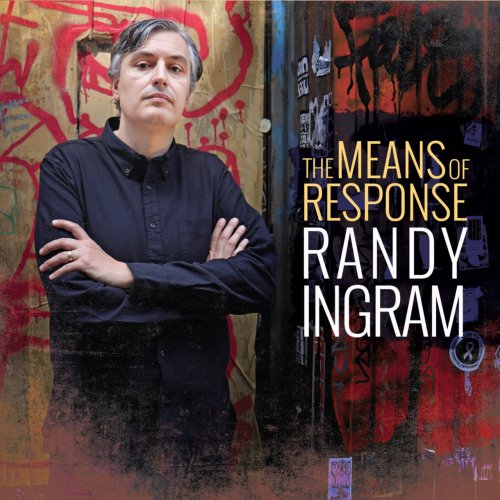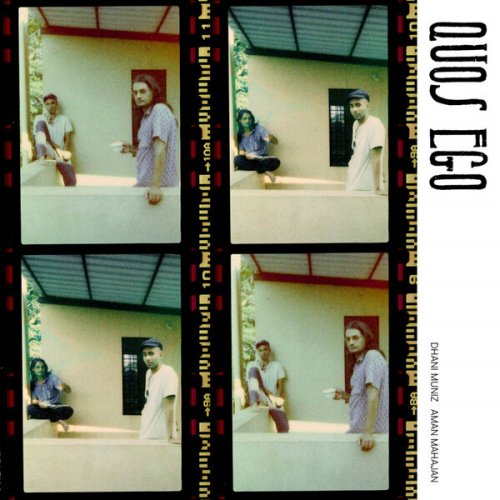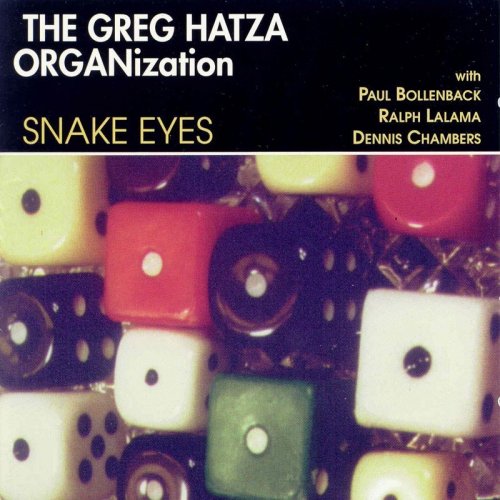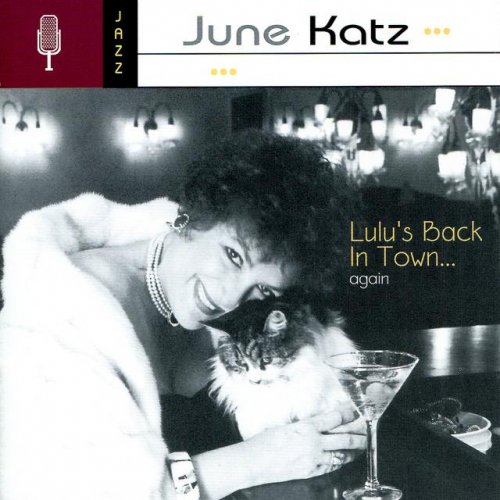Randy Ingram - The Means of Response (2019) [Hi-Res]

Artist: Randy Ingram
Title: The Means of Response
Year Of Release: 2019
Label: Sunnyside Records
Genre: Jazz
Quality: Mp3 320 kbps / FLAC (tracks) / 24bit-96kHz FLAC (tracks)
Total Time: 61:28
Total Size: 145 / 292 MB / 1.10 GB
WebSite: Album Preview
Tracklist:Title: The Means of Response
Year Of Release: 2019
Label: Sunnyside Records
Genre: Jazz
Quality: Mp3 320 kbps / FLAC (tracks) / 24bit-96kHz FLAC (tracks)
Total Time: 61:28
Total Size: 145 / 292 MB / 1.10 GB
WebSite: Album Preview
1. The Means of Response (7:32)
2. Like Flight (6:58)
3. Introduction To Shokunin (1:12)
4. Shokunin (8:35)
5. It Won't End This Way (6:07)
6. Monday Music (6:34)
7. Introduction To Spin (2:51)
8. Spin (6:22)
9. Sleep Little Clark (4:48)
10. The Mountain (4:17)
11. (If You Want It) (6:17)
With The Means of Response, pianist/composer Randy Ingram’s intricate, virtuosic and powerful fourth record, the new father channels his concern over the terrifying racism, xenophobia and injustice that have come to define America today, and offers instead a message of solidarity and hope for his son. Inspired by Bertolt Brecht’s notion that “art is not a mirror held up to reality, but a hammer with which to shape it,” Ingram uses the musical tools at his disposal to channel his feelings and to engage listeners, hopefully inspiring others to action.
At a composer’s residency at The MacDowell Colony following the devastating news of the 2016 election, Ingram began to find a “means of response” in his interaction with other artists, writers and musicians. He found music pouring out of him, leaving him with pieces, both finished and unfinished, that were raw and emotional. Upon learning the happy news that his wife was expecting a child a year later, Ingram began to consider what this new administration and its effect on the world might mean for his family’s future.
An opportunity to host The Musicians’ Show on Columbia University’s WKCR gave Ingram a chance to explore jazz’s rich lineage of protest music. Though the idea of “protest music” might, for some, conjure folk tunes or overtly political compositions of force and volume, Ingram leaned towards a more subtle approach when compiling his playlist; Herbie Hancock’s “The Prisoner” and Milton Nascimento’s “Fairy Tale Song” were perfect examples of artists thoughtfully utilizing their craft to generate nuanced and affecting messages.
These events led Ingram toward the realization that the music on his next recording would be protest music. He continued to compose and sculpt the pieces written at MacDowell over the fall of 2018 and spring of 2019. Ingram then brought bassist Drew Gress and drummer Jochen Rueckert to the Samurai Hotel Studio in Queens to record at the end of March with engineer Michael Perez-Cisneros.
The Means of Response re-unites Ingram with Gress; the two have performed together frequently following their acclaimed duo album The Wandering (Sunnyside, 2017). Rueckert has been a first call drummer for the pianist and appears on his first two records, including Sky/Lift (Sunnyside, 2014). The two complete the trio in a supportive and vibrant way, bringing Ingram’s compositions to life.
The trio begins with the title track, “The Means of Response,” a rallying cry that cements the intention of the album, using music as a tool of resistance, with its rhythmic concept as a symbol of power. The weightless “Like Flight” takes its cues from the legendary partnership of Kenny Wheeler and John Taylor and draws inspiration from Ingram’s studying his son’s first flights, namely his initial forays into walking. While touring Japan, Ingram was inspired by the pride of craftsmanship in the work of a Kyoto based soba master. In an age of ever-shortened attention spans, the mastery of one’s craft can be overlooked; yet it remains a noble and important pursuit and one that is honored on Ingram’s well-honed “Shokunin,” which is the Japanese word for artisan.
The melancholy “It Won’t End This Way” is about the acceptance that society is at a real low point, the rubato ballad giving room for expressive playing from all, including a wonderful turn by Gress on bass. The freely loping “Monday Music” is named for Ingram’s MacDowell studio, which was a gift to the colony at the turn of the century by the Monday Music Club of Orange, N.J.; the tune shows Rueckert at his most dynamically engaging. The harmonically tricky “Spin” is led in by a fantastically shaped solo performance by Ingram. The tune itself never seems to stay in one place long, much like the “news” the population is bombarded with daily from all angles.
Ingram continues the tradition of jazz composers’ writing for their children with his lullaby “Sleep Little Clark,” which echoes the fatherly compassion and care of Herbie Hancock’s “Jessica” and Thelonious Monk’s “Little Rootie Tootie.” The title of “The Mountain” refers to the towering challenges society faces; the trio plays unimpeded in this emotive, near-free piece. The optimistic “(If You Want It)” takes its title from John Lennon and Yoko Ono’s anti-war campaign from 1969, “WAR IS OVER (If You Want It).” It uses Brazilian rhythms to propel the message of taking it upon oneself to make change occur.
The process of creating The Means of Response led Randy Ingram down a path of anger, introspection and positive action. Ingram notes that he agrees with Akira Kurosawa in that “the role of the artist is to not look away.” In The Means of Response, Ingram uses his craft to spread a message of tolerance and humanity, urging us to consider what society needs to do to insure a healthy home for future generations.
Randy Ingram - piano
Drew Gress - piano
Jochen Rueckert - drums
At a composer’s residency at The MacDowell Colony following the devastating news of the 2016 election, Ingram began to find a “means of response” in his interaction with other artists, writers and musicians. He found music pouring out of him, leaving him with pieces, both finished and unfinished, that were raw and emotional. Upon learning the happy news that his wife was expecting a child a year later, Ingram began to consider what this new administration and its effect on the world might mean for his family’s future.
An opportunity to host The Musicians’ Show on Columbia University’s WKCR gave Ingram a chance to explore jazz’s rich lineage of protest music. Though the idea of “protest music” might, for some, conjure folk tunes or overtly political compositions of force and volume, Ingram leaned towards a more subtle approach when compiling his playlist; Herbie Hancock’s “The Prisoner” and Milton Nascimento’s “Fairy Tale Song” were perfect examples of artists thoughtfully utilizing their craft to generate nuanced and affecting messages.
These events led Ingram toward the realization that the music on his next recording would be protest music. He continued to compose and sculpt the pieces written at MacDowell over the fall of 2018 and spring of 2019. Ingram then brought bassist Drew Gress and drummer Jochen Rueckert to the Samurai Hotel Studio in Queens to record at the end of March with engineer Michael Perez-Cisneros.
The Means of Response re-unites Ingram with Gress; the two have performed together frequently following their acclaimed duo album The Wandering (Sunnyside, 2017). Rueckert has been a first call drummer for the pianist and appears on his first two records, including Sky/Lift (Sunnyside, 2014). The two complete the trio in a supportive and vibrant way, bringing Ingram’s compositions to life.
The trio begins with the title track, “The Means of Response,” a rallying cry that cements the intention of the album, using music as a tool of resistance, with its rhythmic concept as a symbol of power. The weightless “Like Flight” takes its cues from the legendary partnership of Kenny Wheeler and John Taylor and draws inspiration from Ingram’s studying his son’s first flights, namely his initial forays into walking. While touring Japan, Ingram was inspired by the pride of craftsmanship in the work of a Kyoto based soba master. In an age of ever-shortened attention spans, the mastery of one’s craft can be overlooked; yet it remains a noble and important pursuit and one that is honored on Ingram’s well-honed “Shokunin,” which is the Japanese word for artisan.
The melancholy “It Won’t End This Way” is about the acceptance that society is at a real low point, the rubato ballad giving room for expressive playing from all, including a wonderful turn by Gress on bass. The freely loping “Monday Music” is named for Ingram’s MacDowell studio, which was a gift to the colony at the turn of the century by the Monday Music Club of Orange, N.J.; the tune shows Rueckert at his most dynamically engaging. The harmonically tricky “Spin” is led in by a fantastically shaped solo performance by Ingram. The tune itself never seems to stay in one place long, much like the “news” the population is bombarded with daily from all angles.
Ingram continues the tradition of jazz composers’ writing for their children with his lullaby “Sleep Little Clark,” which echoes the fatherly compassion and care of Herbie Hancock’s “Jessica” and Thelonious Monk’s “Little Rootie Tootie.” The title of “The Mountain” refers to the towering challenges society faces; the trio plays unimpeded in this emotive, near-free piece. The optimistic “(If You Want It)” takes its title from John Lennon and Yoko Ono’s anti-war campaign from 1969, “WAR IS OVER (If You Want It).” It uses Brazilian rhythms to propel the message of taking it upon oneself to make change occur.
The process of creating The Means of Response led Randy Ingram down a path of anger, introspection and positive action. Ingram notes that he agrees with Akira Kurosawa in that “the role of the artist is to not look away.” In The Means of Response, Ingram uses his craft to spread a message of tolerance and humanity, urging us to consider what society needs to do to insure a healthy home for future generations.
Randy Ingram - piano
Drew Gress - piano
Jochen Rueckert - drums



![Eero Koivistoinen - For Children (1970) [2006] Eero Koivistoinen - For Children (1970) [2006]](https://www.dibpic.com/uploads/posts/2026-02/1771615516_ff.jpg)




